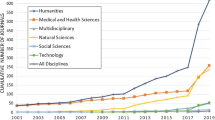Abstract
This is an account of the evolution of ideas and the confluence of support and vision that has eventuated in the founding of the Journal of Empirical Research on Human Research Ethics (JERHRE). Many factors have contributed to the creation of this rather atypical academic journal, including a scientific and administrative culture that finally saw the need for it, modern electronic technology, individuals across the world who were committed to somehow finding common ground between researchers and those charged with ethical oversight of research, a network of helpful colleagues, and a university whose administration gave moral support to the endeavor in a time of fiscal austerity. Perhaps equally important were the decisions to make JERHRE a nonprofit undertaking, to emphasize the implications of empirical research for specific best practices, to serve the educational needs of those concerned with human research, and to seek to stimulate the interest of students in gaining an evidence-based understanding of the research contexts in which they decide to work. This article explores the ‘chemistry’ that has made it possible to develop a somewhat unorthodox journal and set of related activities.
Similar content being viewed by others
References
Citro, C.F., Ilgen, D.R., and Marrott, C.B. (Eds.) (2003). Protecting Participants and Facilitating Social and Behavioral Sciences Research. Washington, District of Columbia: National Academies Press. Note: Institutional Review Board (IRB) is the U.S. equivalent of Research Ethics Board or REB.
Cochrane, A.L. (1972). Effectiveness and Efficiency: Random Reflections on Health Services. London: Nuffield Provincial Hospitals Trust.
Cochrane AL. (1979). 1931–1971: A critical review, with particular reference to the medical profession. In: Medicines for the year 2000. London: Office of Health Economics, pp. 1–11.
Federman, D.D., Hanna, K.E., and Rodriguez, L.L. (Eds.) (2002). Responsible Research: A Systems Approach to Protecting Research Participants. Washington, District of Columbia: Institute of Medicine.
Stanley, B.H., Sieber, J.E., and Melton, G.B. (1993). Research Ethics: A Psychological Approach. Lincoln: University of Nebraska.
Solomon, M.Z. (2005) “Realizing bioethics’ goals in practice: Ten ways ‘Is’ can help ‘Ought,’” Hastings Center Report 35(4), 40–47.
Author information
Authors and Affiliations
Corresponding author
Rights and permissions
About this article
Cite this article
Sieber, J.E. Evidence-Based Ethical Problem Solving: An Idea Whose Time Has Come. J Acad Ethics 3, 113–125 (2005). https://doi.org/10.1007/s10805-006-9009-1
Accepted:
Published:
Issue Date:
DOI: https://doi.org/10.1007/s10805-006-9009-1




